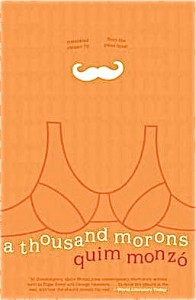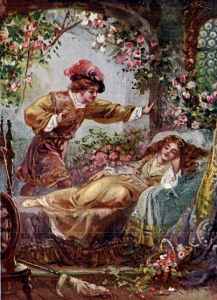“Foreseeing everything creates such boundless disquiet that things pass me by like a breath of air and I enjoy nothing. I only enjoy a kiss when it is over and done with; then I remember it with pleasure. I don’t enjoy it at the time because, beyond the tenderness, I see the darkness, the horrific possibilities lurking behind all that is pleasant.” Speaker, from “Looking Out the Window.”
 Catalan author Quim Monzo’s new collection of short stories captures the reader’s attention with its surprises, tickles with its humor, bewilders with its disturbed, often absurd characters, and ultimately arouses deep sadness with some of its portraits of the elderly and those close to them. Included are seven full-length stories in Part I, and twelve, very clever one- or two-page mini-stories in Part II, all of these stories playing with reality, especially the reality of love, as Monzo’s characters and his readers understand it. These characters often experience and react to a very different reality from that of the reader, however, and, therein lies the stories’ tension as the characters make unexpected or bizarre decisions and move in unique directions. These sudden twists lead to innumerable surprises even for the most jaded reader, and no one can dismiss these stories as “too weird” (even if one were ungracious enough to want to do so) because the characters and their stories share so many details with our own everyday realities. As absurd as the characters and their lives may be, we can see that there are always strong and familiar truths embedded within even the strangest realities here, and we are always able to empathize with some aspect of the characters’ lives.
Catalan author Quim Monzo’s new collection of short stories captures the reader’s attention with its surprises, tickles with its humor, bewilders with its disturbed, often absurd characters, and ultimately arouses deep sadness with some of its portraits of the elderly and those close to them. Included are seven full-length stories in Part I, and twelve, very clever one- or two-page mini-stories in Part II, all of these stories playing with reality, especially the reality of love, as Monzo’s characters and his readers understand it. These characters often experience and react to a very different reality from that of the reader, however, and, therein lies the stories’ tension as the characters make unexpected or bizarre decisions and move in unique directions. These sudden twists lead to innumerable surprises even for the most jaded reader, and no one can dismiss these stories as “too weird” (even if one were ungracious enough to want to do so) because the characters and their stories share so many details with our own everyday realities. As absurd as the characters and their lives may be, we can see that there are always strong and familiar truths embedded within even the strangest realities here, and we are always able to empathize with some aspect of the characters’ lives.

Much of the reader’s recognition of what s/he and the characters share evolves through Monzo’s careful selection of important and recognizable details which pervade our mutual realities. Sometimes he reveals these details through the main character’s point of view, sometimes through specifics of the settings, sometimes through the author’s subtle appeal to the commonsense reality of his readers, and sometimes through the observations of an additional character within a story. No matter how strangely a main character may act, the reader is able to see him/her as just one twist beyond normal, someone who still seems familiar in spite of his/her behavior, living a life not so very different from our own – at least on the surface.
 The first story, “Mr. Beneset,” features a son who visits his very deaf father who is living in a home for the elderly. He is his father’s only visitor. When he enters his father’s room, he finds his father putting on women’s clothing. The father argues with him about respecting privacy and reminisces about their past history, as they kiss each other and share memories of the family. The father wants to be independent, “I’m not like these old guys around here – yet.” The father talks about his own mother, father, brothers, and sisters, and walks outside with his son. Clearly the father loves the son and vice versa, and they are doing the best they can under the circumstances. When the son leaves, the father goes back to his toilette. He is alone, doing what he can to change his reality.
The first story, “Mr. Beneset,” features a son who visits his very deaf father who is living in a home for the elderly. He is his father’s only visitor. When he enters his father’s room, he finds his father putting on women’s clothing. The father argues with him about respecting privacy and reminisces about their past history, as they kiss each other and share memories of the family. The father wants to be independent, “I’m not like these old guys around here – yet.” The father talks about his own mother, father, brothers, and sisters, and walks outside with his son. Clearly the father loves the son and vice versa, and they are doing the best they can under the circumstances. When the son leaves, the father goes back to his toilette. He is alone, doing what he can to change his reality.
In “Love is Eternal” a man runs into a woman he has known in the past and they go to dinner. Eventually he discovers that she is terminally ill, and he decides to do everything he can to make her last days happy, with surprising results. “Saturday” focuses on an old woman who is now alone, having been married for thirty-five years. Something has obviously happened, however, since she is busy cutting up family photos, removing her husband from the pictures. Then she moves on to everything he has worn, taking it to the dumpster, then decides to remove everything he has ever touched in the apartment. As she becomes more and more obviously unhinged, the reader is almost hypnotized, wondering where, if anywhere, she plans to stop.
 “I’m Looking Out of the Window” features a super-conscientious man tired of trying to be prepared for every eventuality in order to avoid unpleasant surprises. He decides to stare out the window for a whole day, never taking his eyes off what is out there, not even to answer the phone, trying to stay in the moment. He even imagines cutting off a part of his ear so that in the hospital he can avoid trying to solve tomorrow’s problems ahead of time. “Praise” is a very funny story about a successful author who, when asked about any new books that he has liked, mentions a book by a debut author. He does not say he loved it, but suddenly his mention of the book takes on a life of its own, bringing the book’s author into his life. The very funny ending is not unexpected in this era of the intrusive press making its own news.
“I’m Looking Out of the Window” features a super-conscientious man tired of trying to be prepared for every eventuality in order to avoid unpleasant surprises. He decides to stare out the window for a whole day, never taking his eyes off what is out there, not even to answer the phone, trying to stay in the moment. He even imagines cutting off a part of his ear so that in the hospital he can avoid trying to solve tomorrow’s problems ahead of time. “Praise” is a very funny story about a successful author who, when asked about any new books that he has liked, mentions a book by a debut author. He does not say he loved it, but suddenly his mention of the book takes on a life of its own, bringing the book’s author into his life. The very funny ending is not unexpected in this era of the intrusive press making its own news.
 My favorite story, and the saddest, is “The Coming of Spring” in which a young man tells about his parents who are confined to a nursing home. Alternating his visits to the nursing home with his visits to the family home to sort out the contents, the author reveals the man’s feelings toward his parents and theirs toward him and toward their life in the home. His mother spent much of her life collecting and storing away plastic bags, and, in fact, “their [whole] world was built on the basis of broken items they never threw out ‘just in case.’ ” They are now old and in a nursing home, and they feel they have lived their lives – they are tired of living. The weather is winter, the situation is bleak, and the only thing the son has to look forward to is “The Coming of Spring.” Sad and filled with poignant moments, Monzo seems to “nail” the feelings of his characters as they contemplate the absurdities of living beyond their “time.”
My favorite story, and the saddest, is “The Coming of Spring” in which a young man tells about his parents who are confined to a nursing home. Alternating his visits to the nursing home with his visits to the family home to sort out the contents, the author reveals the man’s feelings toward his parents and theirs toward him and toward their life in the home. His mother spent much of her life collecting and storing away plastic bags, and, in fact, “their [whole] world was built on the basis of broken items they never threw out ‘just in case.’ ” They are now old and in a nursing home, and they feel they have lived their lives – they are tired of living. The weather is winter, the situation is bleak, and the only thing the son has to look forward to is “The Coming of Spring.” Sad and filled with poignant moments, Monzo seems to “nail” the feelings of his characters as they contemplate the absurdities of living beyond their “time.”
 The mini-stories are all memorable and often very funny. “Next Month’s Blood,” in which the Angel Gabriel tells Mary that she has been graced by God to have a son named Jesus, takes a turn when Mary announces that no, she will not agree. “A Cut,” the tale of a young child who has been attacked with a broken bottle, shows a boy running, bleeding profusely, into his school for help, where he is berated for bursting into the classroom rudely and not observing etiquette. “One Night” tells the story of the prince trying to awaken Sleeping Beauty, with unexpected results.
The mini-stories are all memorable and often very funny. “Next Month’s Blood,” in which the Angel Gabriel tells Mary that she has been graced by God to have a son named Jesus, takes a turn when Mary announces that no, she will not agree. “A Cut,” the tale of a young child who has been attacked with a broken bottle, shows a boy running, bleeding profusely, into his school for help, where he is berated for bursting into the classroom rudely and not observing etiquette. “One Night” tells the story of the prince trying to awaken Sleeping Beauty, with unexpected results.
Filled with wonderful stories which are full of surprises, A Thousand Morons reflects life’s absurdities at the same time that it also reflects the many realities of life and love, an intriguing collection of stories told with wit and panache.
Photos, in order: The author’s photo is from http://www.periodistasanonimos.com
“Mr. Beneset,” illustration: http://olevision.com/
“I’m Looking Out of the Window,” from http://christcm.com
“The Coming of Spring,” illustration from http://www.123rf.com
“One Night,” Monzo’s take on Sleeping Beauty: http://blogs.scientificamerican.com
ARC: Open Letter
